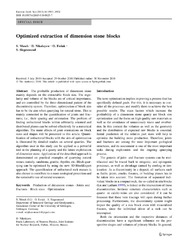Optimized extraction of dimension stone blocks
Mosch, S.
Nikolayew, D.
Ewiak, O.
Siegesmund, S.
63, 7/8: 1911 - 1924
DOI: https://doi.org/10.1007/s12665-010-0825-7
Persistent URL: http://resolver.sub.uni-goettingen.de/purl?gldocs-11858/6793
Persistent URL: http://resolver.sub.uni-goettingen.de/purl?gldocs-11858/6793
Mosch, S.; Nikolayew, D.; Ewiak, O.; Siegesmund, S., 2010: Optimized extraction of dimension stone blocks. In: Environmental Earth Sciences, Band 63, 7/8: 1911 - 1924, DOI: 10.1007/s12665-010-0825-7.
 |
Dokument öffnen: |
The profitable production of dimension stone mainly depends on the extractable block size. The regularity and volume of the blocks are of critical importance, and are controlled by the three-dimensional pattern of the discontinuity system. Therefore, optimization of block size has to be the aim when quarrying for natural stone. This is mainly connected to the quantification of joints and fractures, i.e., their spacing and orientation. The problem of finding unfractured blocks within arbitrarily oriented and distributed planes can be solved effectively by a numerical algorithm. The main effects of joint orientations on block sizes and shapes will be presented in this article. Quantification of unfractured blocks with the aim of optimization is illustrated by detailed studies on several quarries. The algorithm used in this study can be applied as a powerful tool in the planning of a quarry and the future exploitation of dimension stone. Application of the described approach is demonstrated on practical examples of quarrying natural stones, namely, sandstone, granite, rhyolite, etc. Block quarrying can be optimized by using the new 3D-BlockExpert approach. The quantification of unfractured rock masses is also shown to contribute to a more ecological protection and the sustainable use of natural resources.
Statistik:
ZugriffsstatistikSammlung:
- Geologie [933]

